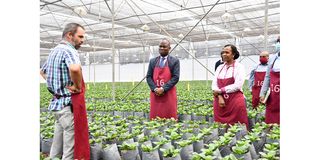Prime
Tanzania champions horti-tourism as dual engine for development

Tanzania is stepping up efforts to integrate horticulture with tourism, aiming to diversify attractions, promote agro-based experiences, and open new income streams for rural communities. PHOTO | COURTESY
What you need to know:
- The establishment of agro-processing zones and the location of farms along major tourist routes could enhance supply reliability while creating new tourism experiences through farm tours, local produce markets, and culinary trails
Arusha. The government has emphasised the need to link the horticulture and tourism sectors to unlock rural economic potential and promote inclusive growth.
Speaking at an agriculture and tourism investors’ dialogue held in Arusha over the weekend, the Permanent Secretary in the Ministry of Agriculture, Mr Gerald Mweli, said the two multi-billion-dollar industries hold the potential to drive rural development.
The dialogue, organised by the Tanzania Horticultural Association (Taha) and the Tanzania Association of Tour Operators (Tato) with support from the Embassy of the Netherlands, brought together investors, tourism and hospitality stakeholders, and government agencies.
In a speech read on his behalf by ministry official, Mr Philbert Philemon, Mr Mweli said it was time to integrate horticulture into the tourism value chain to supply fresh and nutritious food to the hospitality industry.
Despite generating $3.9 billion annually, Tanzania’s tourism sector has largely excluded local horticultural producers due to inefficiencies in supply chains and a lack of direct communication between stakeholders.
Mr Mweli noted that agriculture-tourism linkages offer a promising path for economic transformation, especially in regions such as Arusha, Kilimanjaro and Manyara, which are popular with tourists.
He said investments in horticulture, organic farming, and high-value crops could support both domestic hospitality markets and export demands, while also meeting the culinary needs of the tourism industry.
The establishment of agro-processing zones and the location of farms along major tourist routes, he added, could enhance supply reliability while creating new tourism experiences through farm tours, local produce markets, and culinary trails.
The Taha CEO, Ms Jacqueline Mkindi, said combining horticulture with tourism—known as horti-tourism—could generate employment and boost foreign exchange earnings, especially for rural communities.
She noted that horticulture-based tourism ventures not only attract international visitors but also help reduce poverty by providing reliable income for farmers and workers in related sectors such as tour guiding and hospitality.
Ms Mkindi also commended the Tanzanian government’s efforts to improve market access, irrigation, and agricultural infrastructure, as well as its tourism promotion campaigns such as The Royal Tour, which she said had enhanced Tanzania’s international profile.
She called on stakeholders to use such forums to address challenges, build partnerships, and align strategies to strengthen both sectors.
Mr Mweli concluded by thanking the Government of the Netherlands for its continued support in advancing Tanzania’s agriculture and tourism industries through long-standing collaboration with public and private institutions.




